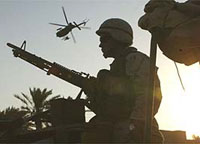US Ambassador in Baghdad draws the real picture of horrible life in Iraq
Today Iraq remains one of the most sensitive and difficult political questions in the world. Western media sources are trying their best to create the illusion that situation in Iraq is improving and that almost all the problems are solved.

However the facts written by US Ambassador in Baghdad Zalmay Khalilzad in his confidential memo addressed to US Secretary of state Condoleezza Rice show the situation in Iraq is far from being perfect.
The following is an edited letter from Zalmay Khalilzad to Condoleezza Rice.
Iraqi staff in the Public Affairs sector have complained that Islamist and Militia groups have been negatively affecting daily routine. Harassment over proper dress and habits is increasingly persuasive. They also report power cuts and fuel prices have diminished their quality of life.
Women's Rights are widely abused
Two of three female employees in the Public Affairs sector report stepped up harassment beginning in mid-May. One, a Shia who favors Western clothing, was advised by an unknown woman in her Baghdad neighbourhood to wear a veil and not to drive her own car. She said some groups are pushing women to cover even their face, a step not taken in Iran even at its most conservative.
Another, a Sunni, said people in her neighbourhood are harassing women and telling them to cover up and stop using cell phones. She said the taxi driver who brings her every day to the green zone has told her he cannot let her ride unless she wears a headcover. A female in the PAS cultural section is now wearing a full abaya after receiving direct threats.
The women say they cannot identify the groups pressuring them. The cautions come from other women, sometimes from men who could be Sunni or Shia, but appear conservative. Some ministries, notably the Sadrist controlled Ministry of Transportation, have been forcing females to wear the hijab at work.
Dress code is not only women’s problem
Staff members have reported it is now dangerous for men to wear shorts in public; they no longer allow their children to play outside in shorts. People who wear jeans in public have come under attack.
Evictions
One colleague beseeched us to help a neighbor who was uprooted in May from her home of 30 years, on the pretense of application of some long-disused law. The woman, who is a Fayli Kurd, says she has nowhere to go, but the courts give them no recourse to this new assertion of power. Such uprootings may be response by new Shia government authorities to similar actions against Arabs by Kurds in other parts of Iraq.
Power cuts and fuel shortages a drain on society
Temperatures in Baghdad have already reached 115 degrees. Employees all confirm that, by the last week of May, they were getting one hour of power for every six hours without. By early June, the situation had improved slightly. In Hal al-Shaab, power has recently improved from one in six to one in three hours. Other staff report similar variances.Central Baghdad neighborhood Bab al-Nu'atham has had no city power for over a month. Areas near hospitals, political party headquarters and the green zone have the best supply. One staff member reported a friend lives in a building that houses the new minister; within 24 hours of his appointment, her building had city power 24 hours a day.
Fuel queues are very long in Baghdad. One employee told us that he had spent 12 hours on his day off waiting to get gas. Another staff member confirmed that shortages were so dire, prices on the black market in much of Baghdad were now above 1,000 ID per liter (the official, subsidized price is 250 ID)
The problem with kidnappings remains
One employee informed us that his brother-in-law had been kidnapped. The man was eventually released but this caused enormous emotional distress to his family. One employee, a Sunni Kurd, received an indirect threat on her life in April. She took extended leave, and by May, relocated abroad with her family.
Security forces are mistrusted
In April, employees began reporting a change in demeanor of guards at the green zone checkpoints. They seemed to be militia-like in some cases seemingly taunting. One employee asked us to get her some press credentials because the guards held her embassy badge up and proclaimed loudly to passers-by "Embassy" as she entered. Such information is a death sentence if heard by the wrong people.
Sectarian tensions are growing within families
Ethnic and sectarian faultlines are becoming part of the daily media fare in the country. One Shia employee told us in late May that she can no longer watch TV news with her mother, who is Sunni, because her mother blamed all the government failings on the fact that Shia are in charge. Many of the employee's family left Iraq years ago. This month, another sister is departing for Egypt, as she imagines the future here is too bleak.
Frayed nerves and mistrust
Against this backdrop of frayed social networks, tension and moodiness have risen. A Sunni Arab female apparently insulted a Shia female by criticizing her overly liberal dress. One colleague told us he feels " defeated" by circumstances, citing the example of being unable to help his two-year-old son who has asthma and cannot sleep in the stifling heat.
At the end of his letter Zalmay Khalilzad said: “Although our staff retain a professional demeanor, strains are apparent. We see their personal fears are reinforcing divisive sectarian or ethnic channels. Employees are apprehensive enough that we fear they may exaggerate developments or steer us towards news that comports with their own world view. Objectivity, civility, and logic that make for a functional workplace may falter if social pressures outside the Green Zone don't abate”.
Source: The Independent
Prepared by Alexander Timoshik
Pravda.ru
Discuss this article on Pravda.ru English Forum
Subscribe to Pravda.Ru Telegram channel, Facebook, RSS!





